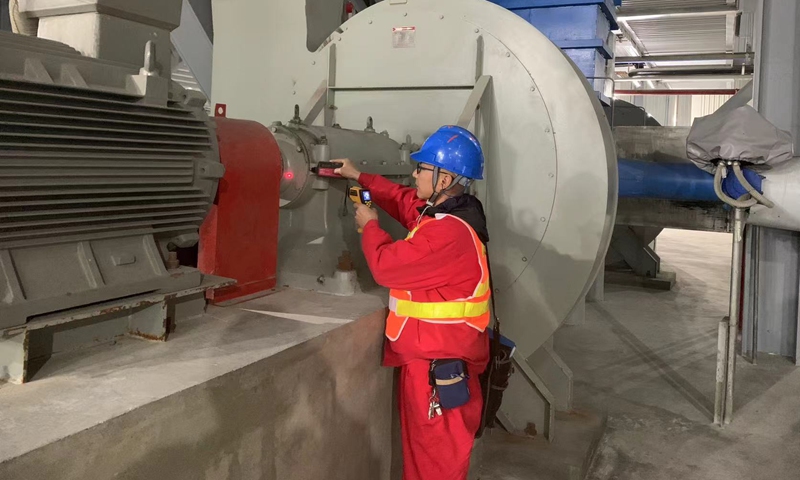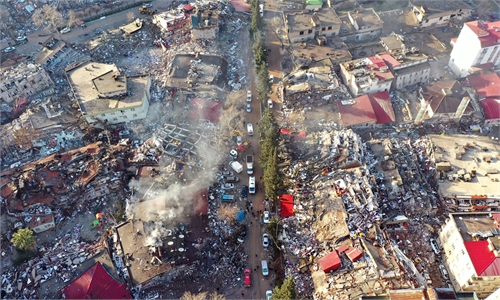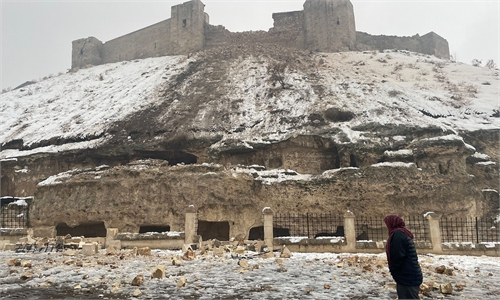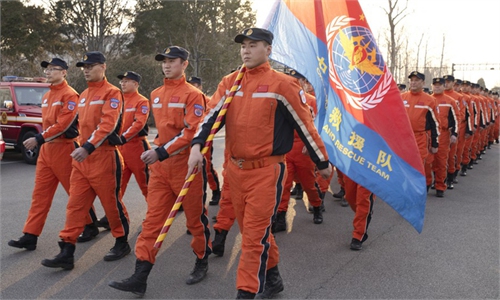Hunutlu Thermal Power Plant, flagship project of BRI, remained operational during and after giant earthquake in Turkey

A Chinese engineer conduct checking after the giant earthquake on February 6, 2023 at the Hunutlu Thermal Power Plant. Photo: Courtesy of China Energy Engineering Corp
Chinese-backed projects have reported only a limited impact after the recent giant earthquake and subsequent aftershocks devastated parts of the eastern Mediterranean, affecting Turkey and Syria.
The Hunutlu Thermal Power Plant, a flagship project under the China-proposed Belt and Road Initiative (BRI), remained operational during and after the earthquake, generating precious electricity in moments of need, the Global Times learned.
Under the BRI and Turkey's "Middle Corridor" vision, China and Turkey have carried out a series of practical cooperation projects in areas such as infrastructure, energy, transportation, digital technology and finance.
A video clip showed fire and damage at the Limak Port at Iskenderun, according to media reports. The port's operation has been suspended.
Iskenderun is not far away from the Hunutlu Thermal Power Plant, the largest China-invested coal-fired power plant in Turkey with two units of 660-megawatt power generation equipment and direct investment of $1.7 billion. The power plant became fully operational in October last year after construction started in September 2019.
China Energy Engineering Corp (Energy China), the Hunutlu Thermal Power Plant's designer, sent a statement to the Global Times on Tuesday stating that the project, thanks to the reliable quality of Made in China equipment, was undamaged during and after the giant earthquake.
The power plant continues to generate power, which offered a secured guarantee to the aid work in the quake-stricken area, even as two nearby power plants were knocked offline by the quake and tightened power supply in the region, Energy China said in the statement.
The power plant is located near the epicenter of the earthquake and the living quarters for engineers were not damaged by the quake.
Zhang Guolei, a manager at the site, was among the first of the Chinese engineers to check the power plant's safety amid heavy rain before dawn of Monday, shortly after the initial wave of the earthquake began to cease.
"Fortunately, the structure of the plant remained sound. The equipment was working, and everything was safe and stable," the statement said.
The project's team also provided shelters to relatives of Turkish employees, whose houses were damaged in the quake.
Energy China's workers' union in Beijing has reached out the project site over the delivery of charity and aid goods for local employees and residents based on the local situation.
The direct impact of the earthquake for some Chinese companies with projects or branch offices situated in the central and western part of Turkey has so far been limited, the Global Times learned on Tuesday afternoon.
One branch company of PowerChina based in Istanbul, which is situated relatively far away from the center of the earthquake, said that they did not feel the earthquake and everything was normal so far.
Several employees of another Chinese branch company based in Aksaray in central Turkey said that they felt the heavy tremors on the ground but there were no reports of casualties or houses collapsing in the place where the project is located.
China announced on Tuesday 40 million yuan ($5.8 million) of emergency assistance to Turkey and the dispatch of a rescue and medical team. It will also provide Syria with emergency aid, according to the China International Development Cooperation Agency.
Some Chinese companies also offered help. The Spacety Co, a company based in Central China's Hunan Province, immediately arranged for its Chaohu-1 satellite to conduct emergency imaging of the earthquake zone, the Global Times learned.



